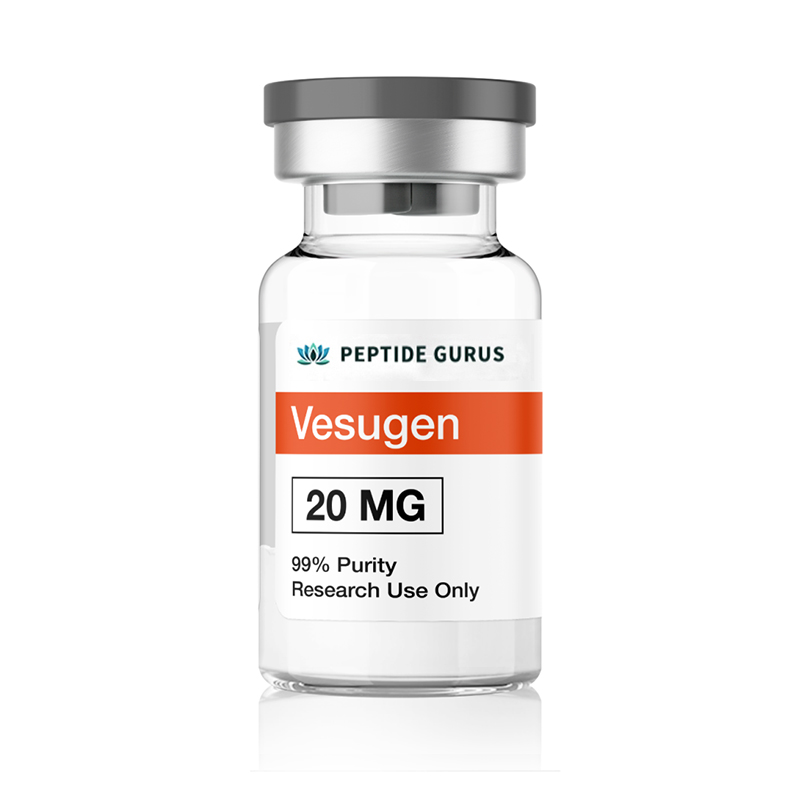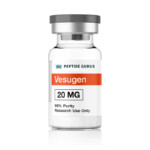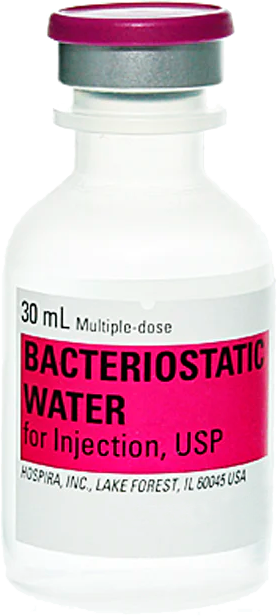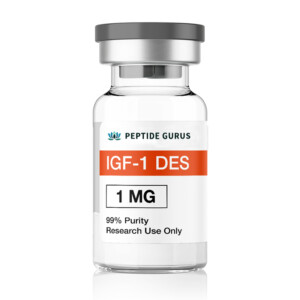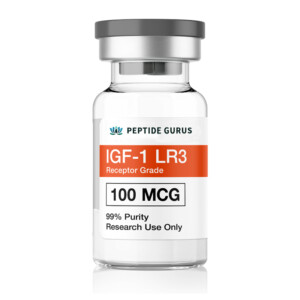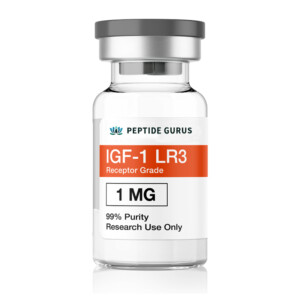Gratis (1) 30 ml de agua bacteriostática
con pedidos calificados sobre $500 Dólar estadounidense.
(excluye productos en cápsulas, péptidos cosméticos, códigos promocionales y envío)
Vesugen is a bioregulator and geroprotective tripeptide. Research has shown it to protect the vascular system from the effects of aging by limiting the development of atherosclerosis and decreasing overall endothelial cell dysfunction. Systems that are sensitive to vascular damage and decline therefore show the most obvious effects from Vesugen administration. These systems include the central nervous system and cardiovascular system. Vesugen appears to play a prominent role in regulating sirtuin 1 protein levels. sirtuina 1 has important effects on metabolic processes and helps to reduce the effects of aging. sirtuina 1 is activated as a result of calorie restriction and is therefore thought to be one of the proteins responsible for the profound anti-aging effects associated with calorie restriction.
Uso del producto: Este PRODUCTO ESTÁ DISEÑADO ÚNICAMENTE COMO QUÍMICO DE INVESTIGACIÓN. Esta designación permite el uso de productos químicos de investigación estrictamente para pruebas in vitro y experimentación de laboratorio únicamente.. Toda la información del producto disponible en este sitio web es solo para fines educativos.. La introducción corporal de cualquier tipo en personas o animales está estrictamente prohibida por la ley.. Este producto sólo debe ser manipulado por personal autorizado., profesionales cualificados. Este producto no es un medicamento., alimento, o cosmético y no puede estar mal etiquetado, mal utilizado o mal etiquetado como droga, comida o cosmética.
Vesugen
Vesugen (Lys-Glu-Asp) is a tripeptide with primary effects on the vascular system. Because the vascular system is important throughout the body and in every metabolic process, Vesugen has wide-ranging impact. Research shows that it can improve neuron survival in the central nervous system, decrease atherosclerosis/restenosis to protect blood vessels, and increases cell survival and tissue health throughout the body. There is also research to suggest that Vesugen may be important in the regulation of addictive and reward behavior. Vesugen is an anti-aging peptide, in part because it mimics some of the effects of calorie restriction. Calorie restriction has long been understood to promote longevity.
Vesugen Structure
Secuencia de aminoácidos: Lys-Glu-Asp (KED)
Fórmula molecular: C15h26norte4oh8
Peso molecular: 390.39 g/mol
PubChem CID: 87571363
Sinónimos: lysylglutamyl aspartic acid, SCHEMBL3767701, CHEBI:159909
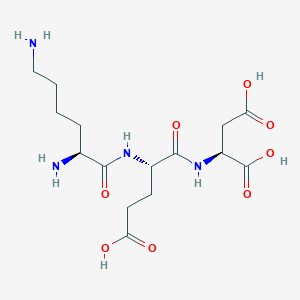
Vesugen 20mg and the Brain
Vesugen is a promising neuroprotective peptide with potential applications in the treatment of Alzheimer’s disease. Oral administration of the peptide to elderly individuals with functional disorders of the central nervous system (SNC) has resulted in improved memory in past experiments. The peptide has also been shown to restore synaptic plasticity, which is to say the ability of neurons to make and strengthen connections between themselves[1].
Like most bioregulatory peptides, Vesugen appears to regulate the expression of genes involved in apoptosis and neuron differentiation. Research shows that Vesugen has an impact on the genes for p16, p21, NES, GAP43, nestin, SUMO, APOE, and IGF1. Some of these peptides are involved in apoptosis (muerte celular programada) of neurons while others are involved in neuron growth or have been shown to play a role in Alzheimer’s disease pathogenesis[1].
Research also shows that peptides like Vesugen, epitalon, Pinealon, and Violon can reduce the effects of hypoxia (oxygen deprivation) in the central nervous system. They appear to do this by boosting anti-oxidative enzyme levels and thus helping to counteract the increase in neurotoxic reactive oxygen species that occurs when oxygen levels decline[2]. Según la Dra.. Linkova, a Russia specialist in aging and gerontology, this effect of Vesugen could not only be useful in the setting of hypoxic events like stroke or heart attack, but also in the setting of neonatal hypoxia during birth.
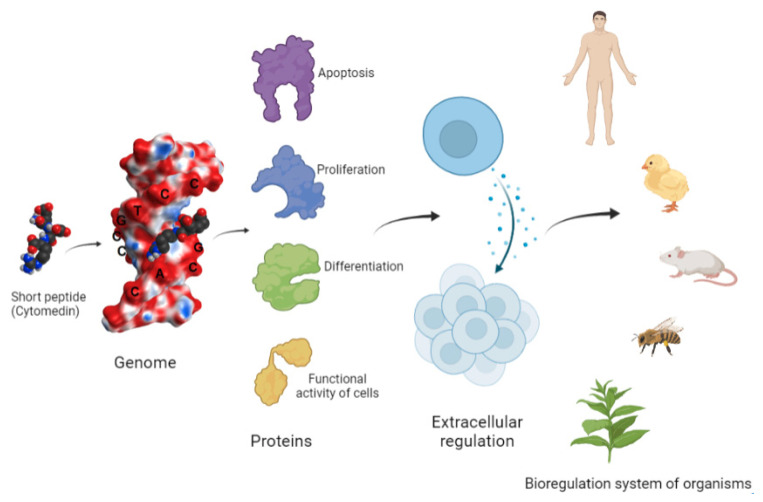
Vesugen and Blood Vessels
At least part of the reason that Vesugen protects the central nervous system comes down to the fact that it protects blood vessels from the clogging effects of atherosclerosis and therefore serves to maintain both the supply of nutrients to various tissues as well as the removal of waste products. The latter may be more important in long-term brain health given that research has shown the brain to produce high amounts of metabolic byproducts that, if not removed promptly, can be toxic to neurons. Having a robust blood supply helps to ensure neurons remain in a healthy environment. De hecho, the bulk (though not all) of Vesugen’s geroprotective effects may boil down to its impact on vascular health.
Research shows that Vesugen is effective in the treatment of atherosclerosis and other cardiovascular disorders, particularly in older individuals. It affects the expression of genes responsible for endothelial regulation and health. Endothelial cells are the cells that line the insides of blood vessels. Research in mice shows that Vesugen prevents the development of atherosclerosis and vascular stenosis (narrowing due to endothelial overgrowth) by normalizing endothelin-1 expression and increasing sirtuin 1 expresión[3]. Sirtuin helps to prevent lipid production and stimulates the oxidation (burning) of fatty acids by altering transcription factors and thus controlling large numbers of genes. Research shows that it contributes to longevity, which means that Vesugen is, at least indirectly, and anti-aging peptide.
The ability of Vesugen to prevent lipid peroxidation (a process that is different from oxidation) increases the stability of red blood cell membranes, which stabilizes the vasculature. This leads to a decrease in the percent of dead cells circulating through blood vessels (especially in the central nervous system) and may serve to reduce rates of apoptosis/necrosis[4].
Additional research reveals that Vesugen stimulates proliferation-associated protein Ki-67 in blood vessels and that levels of Vesugen naturally decline with age[5]. This would suggest that at least part of the reason that rates of vascular disease rise with age is not because of diet or environmental exposure, but simply because these cells start to lose protective mechanisms as Vesugen levels decline. Supplementation with Vesugen 20mg, which has been shown to be orally active, could help to prevent this age-related decline.
Vesugen and Diabetes
Vesugeno 20 mg, as pointed out in the section on blood vessel health, activates sirtuin 1, which has been shown to play important roles in insulin sensitivity. Research in mice shows that activation of sirtuin 1 by compounds like Vesugen or the antioxidant resveratrol, increase insulin sensitivity and helps to attenuate the insulin resistance caused by eating a high fat diet[6].
In addition to helping to regulate insulin sensitivity, sirtuin 1 has also been shown to affect the activity of PGC1-alpha and the ERR-alpha complex. These proteins are important regulators of large components of the metabolic pathway. Regulation of these pathways helps to improve overall metabolism and fight off the development of metabolic syndrome[7], [8].
Vesugen and Addiction
Research shows that sirtuin 1 is part of a large complex of proteins that regulate the D1-type of dopaminergic spiny neurons in the central nervous system. These neurons are important in the pathogenesis of addiction. These neurons play important roles in motivation, reward, and habit formation. Dysfunction of these systems are linked to addiction and schizophrenia as well as Parkinson’s disease. The ability to regulation their function may provide important new tools in the treatment of various psychiatric and neurological disorders.
Vesugen and Aging
It has long been known that caloric restriction is a highly effective means of prolonging life. De hecho, research suggests that calorie restriction may have the single largest impact on longevity of anything discovered to date. What is unclear, sin embargo, is exactly how calorie restriction produces this effect.
At least part of the answer, parece, comes down to changes in patterns of protein expression. Research shows that increases in sirtuin 1 that result from calorie restriction result in deactivation of the p53 protein. Down regulation of p53 function helps to slow the rate of apoptosis, which means that cells survive for longer. This is critical in tissue where cells are either slowly replaced (tejido cardiaco) or are not replaced at all (neurons).
Además, sirutin 1 also stimulates the process of autophagy[9]. Autophagy is an important component of tissue health in which cellular components are recycled and renewed. This leads to improved functionality of cells and decreases the presence of waste materials and debris.
En general, the activation of sirtuin 1 helps to improve cell and tissue health both by helping cells with regular housekeeping duties and by prolonging survival. This effect can be achieved via fasting or calorie restriction, but these practices are not easy to maintain over a lifetime. Dr. Vladimir Khavinson, considered to be the father of bioregulator peptide investigation, Vesugen has the same effect as calorie restriction. De este modo, the peptide may be a suitable alternative to achieving the effects of calorie restriction without actually restricting calories.
Research on Vesugen indicates that it is, indeed, and anti-aging peptide. Administration of Vesugen to adults with polymorbidity and organic brain syndrome shows that the peptide has significant anabolic (tissue and cell building) efectos. These anabolic effects lead to improved activity both in the central nervous system and throughout the body. Measurement of biological indicators of age reveals an overall slowing of the rate of aging in this setting. In some ways, Vesugen shows more potent geroprotective effects than the vaunted Pinealon peptide[10]. The two peptides are likely synergistic when administered in combination.
Vesugen Summary
Vesugen is a bioregulator and geroprotective tripeptide. It protects the vascular system from the effects of aging by limiting the development of atherosclerosis and decreasing overall endothelial cell dysfunction. Systems that are sensitive to vascular damage and decline therefore show the most obvious effects from Vesugen administration. These systems include the central nervous system and cardiovascular system. Vesugen appears to play a prominent role in regulating sirtuin 1 protein levels. sirtuina 1 has important effects on metabolic processes and helps to reduce the effects of aging. sirtuina 1 is activated as a result of calorie restriction and is therefore thought to be one of the proteins responsible for the profound anti-aging effects associated with calorie restriction.
Autor del artículo
La literatura anterior fue investigada, editado y organizado por el Dr.. mi. logan, MARYLAND. Dr. mi. Logan tiene un doctorado de Facultad de Medicina de la Universidad Case Western Reserve y una licenciatura. en biología molecular.
Autor de revista científica

Profe. Vladimir Khavinson is being referenced as one of the leading scientists involved in the research and development of Vesugen. De ninguna manera este médico/científico respalda o defiende la compra, venta, o uso de este producto por cualquier motivo. No hay afiliación o relación., implícito o no, entre
Citas referenciadas
- V. k. Khavinson, norte. S. soy duro, y r. S. umnov, “Peptide KED: Molecular-Genetic Aspects of Neurogenesis Regulation in Alzheimer’s Disease," Toro. Exp. biol. Con., volumen. 171, No. 2, páginas. 190–193, Puede 2021, doi: 10.1007/s10517-021-05192-6.
- l. S. Kožina, “[Investigación de las propiedades antihipóxicas de los péptidos cortos.]," Avanzado. gerontol. Uspekhi Gerontol., volumen. 21, No. 1, páginas. 61–67, 2008.
- k. l. Kozlov et al., “[Molecular aspects of vasoprotective peptide KED activity during atherosclerosis and restenosis]," Avanzado. gerontol. Uspekhi Gerontol., volumen. 29, No. 4, páginas. 646–650, 2016.
- l. S. Kožina, A. V. Arutiunian, S. l. Stvolinskiĭ, y V. k. Khavinson, “[Biological activity of regulatory peptides in model experiments in vitro]," Avanzado. gerontol. Uspekhi Gerontol., volumen. 21, No. 1, páginas. 68–73, 2008.
- V. k. Khavinson, S. I. Tarnovskaia, norte. S. soy duro, mi. oh. Guton, y E. V. Elashkina, “[Epigenetic aspects of peptidergic regulation of vascular endothelial cell proliferation during aging]," Avanzado. gerontol. Uspekhi Gerontol., volumen. 27, No. 1, páginas. 108–114, 2014.
- C. Sol et al., “SIRT1 improves insulin sensitivity under insulin-resistant conditions by repressing PTP1B," Metabolismo celular., volumen. 6, No. 4, páginas. 307–319, Oct. 2007, doi: 10.1016/j.cmet.2007.08.014.
- S. Nemoto, METRO. METRO. Fergusson, y T. Finkel, “SIRT1 functionally interacts with the metabolic regulator and transcriptional coactivator PGC-1{alfa}," j. biol. química., volumen. 280, No. 16, páginas. 16456–16460, Abr. 2005, doi: 10.1074/jbc.M501485200.
- METRO. Lagouge et al., “Resveratrol improves mitochondrial function and protects against metabolic disease by activating SIRT1 and PGC-1alpha," Celúla, volumen. 127, No. 6, páginas. 1109–1122, Dic. 2006, doi: 10.1016/j.cell.2006.11.013.
- I. h. Sotavento et al., “A role for the NAD-dependent deacetylase Sirt1 in the regulation of autophagy," Proc. nacional. Acad. ciencia. Ud.. S. A., volumen. 105, No. 9, páginas. 3374–3379, Mar. 2008, doi: 10.1073/pnas.0712145105.
- V. norte. Meshchaninov, mi. l. Tkachenko, S. V. Zharkov, I. V. Gavrílov, y yo. mi. Katyreva, “[EFECTO DE LOS PEPTIDOS SINTÉTICOS SOBRE EL ENVEJECIMIENTO DE PACIENTES CON POLIMORBIDEZ CRÓNICA Y SÍNDROME CEREBRAL ORGÁNICO DEL SISTEMA NERVIOSO CENTRAL EN REMISIÓN]," Avanzado. gerontol. Uspekhi Gerontol., volumen. 28, No. 1, páginas. 62–67, 2015.
TODOS LOS ARTÍCULOS E INFORMACIÓN DE PRODUCTOS PROPORCIONADOS EN ESTE SITIO WEB SON SÓLO PARA FINES INFORMATIVOS Y EDUCATIVOS.
Los productos ofrecidos en este sitio web se proporcionan únicamente para estudios in vitro.. Estudios in vitro (latín: en cristal) se realizan fuera del cuerpo. Estos productos no son medicamentos ni fármacos y no han sido aprobados por la FDA para prevenir, tratar o curar cualquier condición médica, dolencia o enfermedad. La introducción corporal de cualquier tipo en personas o animales está estrictamente prohibida por la ley..


